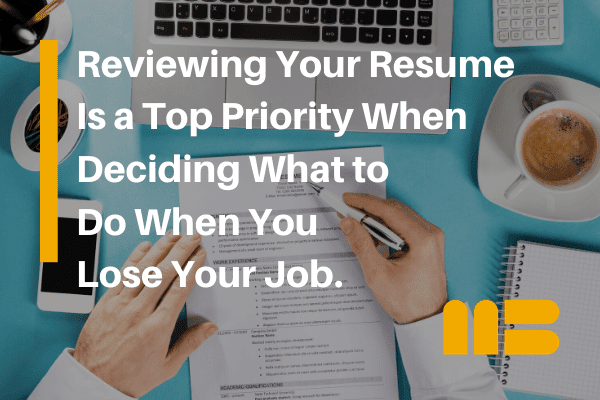Understanding what to do when you lose your job is important for many reasons. Losing your job is a very tough experience and it’s normal to feel lost, hurt, and overwhelmed due to the often unexpected change. It’s also easy to wallow in self-pity and delay getting started. We believe it’s important to act from a position of strength and knowledge rather than reacting emotionally to the loss. Instead of taking a defeatist outlook, consider looking at the situation as an opportunity for self-discovery and growth.
In light of COVID-19 and many recent mergers and acquisitions, it’s important to give yourself some time to adjust to the loss of your job and then start taking action.
Before we get into the action items, it’s important to acknowledge a few things NOT TO DO.
- DO NOT delay filing for unemployment.
- DO NOT take your job loss personally.
- DO NOT liquidate your 401K.
- DO NOT badmouth your former employer.
30 Action Items for What to Do When You Lose Your Job
In this post, we’re going to share a host of actionable tips that, if implemented correctly, will help you forget all about your previous job and prepare you for the next best thing.
1. Acknowledge the Situation
 Getting laid off sucks. Rather than drowning in your sorrow, however, understand that you’re not the first, and you’re not alone. Unemployment is a great time to reach out to your professional mentors for a great sounding board. If you were laid off with a group of colleagues at the same time, then you’ve found the perfect support group to converse with and share leads.
Getting laid off sucks. Rather than drowning in your sorrow, however, understand that you’re not the first, and you’re not alone. Unemployment is a great time to reach out to your professional mentors for a great sounding board. If you were laid off with a group of colleagues at the same time, then you’ve found the perfect support group to converse with and share leads.
I can’t change the direction of the wind, but I can adjust my sails to always reach my destination. -Jimmy Dean
2. File for Unemployment
Unemployment insurance is a form of compensation provided by state unemployment insurance programs to people who get laid off from their jobs through no fault of their own. Eligibility for unemployment insurance, benefit amounts, and the length of time benefits are available are determined by laws in your state.
If you meet the eligibility requirements established by your state, you are entitled to receive temporary compensation, generally half your earnings up to a maximum amount. Wrongful termination can result in eligibility for unemployment benefits, as well as possibly some company benefits.
Filing for unemployment varies by state, but you should be able to file online. Unemployed workers can visit the unemployment benefits website to submit a new unemployment claim, claim weekly benefits, or check on the status of an existing unemployment compensation claim. Filing by phone is also an option.
3. Watch Your Expenses
In addition to starting the hunt for a new job, you have to get your finances in order to make up for a reduction of income.
Keep a closed eye on your expenses and stretch your severance as long as you can. Also, seek additional ways to save and manage your money by creating a budget. While trying to lower your bills to the minimum be sure to acknowledge payments due every month such as rent, utilities, and especially credit cards. Moreover, consider downsizing your lifestyle and limiting your discretionary spending as much as possible.
4. Review Your Health Insurance Options
After being laid off, you should check with your company’s HR department on viable health insurance options. Check if there are any options for continuing your insurance coverage. If there aren’t any, try discussing a new policy that can cover you until you’re employed again.
Per healthcare.gov, if you have just left your job for any reason and lost your job-based health coverage, you qualify for a Special Enrollment Period. This means you can enroll in a Marketplace insurance plan at any time of year. You usually have 60 days from the day you lose your coverage to enroll. You can learn how to apply for a special enrollment period here.
5. Check Your Retirement Plan
Your pension or retirement plan is another thing you need to look into upon getting laid off. What happens to your retirement plan after leaving a job can change based on the program itself. Will you get the money? Are there any tax consequences? These are all things to consider.
Regarding your 401K, for example, you typically have four choices when you change jobs all with specific advantages and disadvantages.
Keep your money in your former employer’s 401(k) plan
This is your legal right if you have at least $5,000 in your account. Ask how long you have to decide. In most cases, you get 30 to 90 days. If your account holds under $5,000, your employer has the option of cashing you out of the plan. (If that’s your situation, skip to choice #3.)
Roll your money into your new employer’s 401(k) plan
Almost all 401(k) plans now accept rollovers from other retirement plans. You should certainly contribute to your new plan. But should you transfer your old account into it?
Move your money into an Individual Retirement Account (IRA)
This choice gives you maximum control and flexibility. With a 401(k) plan, the employer chooses the investments and makes the rules—and the rules vary from plan to plan. With an IRA, you’re in charge.
Cash-out your old account
Think long and hard before you do this. It’s almost never the best choice—and it triggers a big tax bill!
6. Figure Out Your Next Step
Before embarking on your quest for a new position, you must take a bit of time to reflect on your strengths and weaknesses. Looking back will help you pinpoint the types of jobs for which you are qualified. Also, what do you value most in a job? Is it money, title, location, or the nature of the job itself?
Your work is going to fill a large part of your life, and the only way to be truly satisfied is to do what you believe is great work. And the only way to do great work is to love what you do. If you haven’t found it yet, keep looking. Don’t settle. As with all matters of the heart, you’ll know when you find it. -Steve Jobs
7. Review Your Resume
 Reviewing your resume is a top priority when deciding what to do when you lose your job. Perhaps you have been working in the same role for a while. That’ll require you to reconstruct your outdated resume and make it more presentable. Consider search engine optimization when updating your resume and make sure it’s simplified, organized, and easily readable.
Reviewing your resume is a top priority when deciding what to do when you lose your job. Perhaps you have been working in the same role for a while. That’ll require you to reconstruct your outdated resume and make it more presentable. Consider search engine optimization when updating your resume and make sure it’s simplified, organized, and easily readable.
- Remove old positions
- Update skills and core competencies
- Check keywords for SEO
- Double-check formatting so it’s visually appealing and easy to read
- Remove dated phrases
- Save it appropriately in .pdf format with your first and last name and “resume”
- Refresh contact information
- Make sure your summary, profile, or headline at the top sounds current and doesn’t have cliched phrases
8. Proofread Anything Before Sending
Before submitting an email, job application, cover letter, or even a thank-you note, you need to proofread the content for typos, grammatical, and punctuation mistakes. Moreover, you need to double-check that you’ve written the hiring manager’s and company’s names correctly. Consider using an app like Grammarly to double-check your grammar and punctuation.
9. Clean Up Your Social Media
Your social media accounts can have a vital impact on how recruiters view you, especially if you land an interview via an online platform. You want to make sure all of your posts are appropriate for the public. If they’re not fit for public consumption, you can remove them or adjust their privacy. Here are a few tips for cleaning up social media for your job search.
- Make your accounts private
- Hide or delete any inappropriate posts
- Deactivate old accounts
- Add the right photos
- Add a professional bio
- Edit your handles and URLs
- Post-industry-related news, quotes, or articles
- Follow inspiring people and companies
10. Consider Transitional Jobs
Your quest for a new job might not be as straightforward as you’d like it to be, which is why you need to embrace transitional employment as a means of making ends meet until you land a job of your choice. Be it a full-time or part-time job or consultancy, it’s worth considering as you continue your search.
11. Start Networking Right Now
When looking for a new job, you want to reach out to as many professional contacts as possible. They might give you advice that can help you with your search for a job, or maybe they can point you in the direction of a job opening. Get active on social media, especially LinkedIn. A few reasons to begin networking sooner than later include:
- People conduct business primarily with people they know and like. Resumes and cover letters alone are often too impersonal to convince employers to hire you.
- Job listings tend to draw piles of applicants, which puts you in intense competition with many others. Networking makes you a recommended member of a much smaller pool.
- The job you want may not be advertised at all. Networking leads to information and job leads, often before a formal job description is created or a job announced.
12. Join a Relevant Group
The process of looking for a new job can be overwhelming, especially when the job market is tight. We strongly suggest joining industry networking groups to expand your network and meet more professionals with similar interests.
- Alumni Organizations
- Your Local Chamber Of Commerce
- Meetup.com
- ExecuNet
- NetShare
- Chief Executive Network
- Executive Networking Groups such as FENG, MENG, & TENG
- BNI International
14. Utilize Online Job Boards
Another action item of what to do when you lose your job is to check out job boards such as ZipRecruiter and Indeed. Almost all major job boards allow you to search for jobs by keyword, radius, location, etc. Also, consider niche sites within your industry. Here are some more ideas for finding jobs online.
15. Leverage LinkedIn
The vast majority of recruiters utilize LinkedIn as a means of looking for prospects. Thus, if you’re not on LinkedIn, you’re not on the radar of any recruiter. Here’s the thing, LinkedIn is arguably the most prominent platform for job searching, so you must make the best out of it. Here are five things to do on Linkedin right now.
16. Strengthen Your LinkedIn Profile
 Everyone has a LinkedIn account; however, a lot of people don’t give sufficient attention to building out a truly excellent profile. The road to improving your chances of getting recruited and building a solid network begins with tidying up a few LinkedIn sections. Consider adding multimedia, watching out for canned words, and minding exaggeration. Grow your network and increase your chances of finding new career opportunities by building authentic relationships.
Everyone has a LinkedIn account; however, a lot of people don’t give sufficient attention to building out a truly excellent profile. The road to improving your chances of getting recruited and building a solid network begins with tidying up a few LinkedIn sections. Consider adding multimedia, watching out for canned words, and minding exaggeration. Grow your network and increase your chances of finding new career opportunities by building authentic relationships.
17. Always Avoid Buzzwords
When you’re setting up your LinkedIn account or any account of a platform for job searching, try to avoid buzzwords as much as possible. Everyone on these platforms is “creative,” “analytical,” “driven,” “responsible,” and many more of these generic adjectives. Stand out from the pack!
18. Make Your Summary a Story
It’s essential to have a compelling summary on any job-search platform, especially LinkedIn. It’s vital not to leave this field blank. But instead of writing a generic, unrelatable summary, try to tell your own story in a relatable manner. Don’t just write your skills, write why your skills matter.
- Routinely revisit your LinkedIn summary section to make sure it provides you with a crisp and professional online presence.
- Use first-person, make it easy to skim, and maximize the first two lines.
- The content should be well thought out and concise.
- Leverage industry keywords and make sure contacts know how to get a hold of you.
19. Reach Out to Recruiters
Now that you’ve rebuilt your resume, updated your LinkedIn account, and dabbled with online boards, it’s time to reach out to recruiters in your target industry. Niche recruiters like MatchBuilt, for example, are recruiters that specialize in residential construction and building materials recruiting.
20. The Internet Isn’t Enough
Most HR representatives tend to interview personal referrals before interviewing applicants who have no relationship with the people on the inside. Try approaching an internal recruiter or even scheduling informational interviews to endear yourself to the people on the inside.
21. Write Compelling Cover Letters
You’re not the only one fighting for that job position you’re after, and so you need to create cover letters that present a compelling case to recruiters (learn how to respond to a recruiter on LinkedIn here) as to why they should hire you. And don’t use a generic cover letter for each job.
Here are a few pointers to writing compelling cover letters.
- Introduce Yourself
- Explain Why You Are the Best Candidate
- Be Enthusiastic About the Role
- Summarize and Request a Follow-Up
Consider formatting your cover letter as though you were going to send it in the mail, even if you’re sending it by email. This makes it look more professional.
Here’s a point-by-point guide for laying out your cover letter:
- Write your name and address at the top of the page. Align it to the right.
- Write the name and address of the prospective employer. Align it to the left.
- Add the date of your letter under the employer’s address, and align it to the left. Leave a line space between the address and the date.
- Begin your letter with “Dear…” and the name of the hiring manager. Avoid “To whom it may concern.” If you don’t know who to address the letter to, send the HR department an email asking for the appropriate recipient.
- Use a font that’s clear and easy to read, such as Arial or Helvetica, with a type size of 10 or 12 points.
- Space your paragraphs, keep wide margins, and don’t crowd the page.
- Leave a line space under the final paragraph, and sign off with “Yours sincerely” or “Best regards.” Leave a couple of line spaces under the signoff, and then sign your name, typing it in full beneath your signature. If you are sending the letter digitally, it’s not necessary to actually sign it – just type your name instead.
22. Don’t Apply for Every Job
When hunting for a job following the loss of a job, it’s not wise to apply for every single post you find. You need to seek out the jobs that are a perfect match with your qualifications so that you can shine and ascend. The more specific you are, the higher your chances of landing a job that caters to your set of skills.
23. Follow Up On Your Applications
Did you apply for the job of your dream and didn’t hear back from the company? Well, if you see the job posted again, it’s entirely fine to apply for it once more. However, you need to make sure your resume matches the job requirements. Try to get a referral to make things easier for you.
24. Construct Your Job Loss Narrative During Interview
At some point in your interview, your target company is going to ask why you were laid off from your last position. You want to be precise, framing things positively and professionally. After that, put the focus on how thrilled you are about the opportunity to be considered for this job.
If you are going to discuss why you were let go from your previous position, consider the following.
- Make sure you know your previous company’s policy on what exactly you can say.
- Be honest
- Avoid the blame game
- Redirect back to why you are the perfect fit.
25. Utilize the STAR Method When Answering Interview Questions
When you’re asked questions during your next job interview, consider using the STAR method when answering.
Be prepared for behavioral interview questions that’ll require you to share examples of specific situations you’ve been in. It’ll be easy to understand when these types of questions are coming because they often start with, describe a situation when you.
- Tell me about a time when you
- Have you ever
- Give me an example of a time when
- What do you do when
- Describe situations where
The STAR interview technique is an excellent strategy for tackling these types of questions. STAR is an acronym that stands for:
Situation: Describe the example case you were in
Task: Describe what your responsibility was in that situation.
Action: Explain precisely what steps you took to address it.
Result: Share what outcomes your actions achieved.
26. Always Dress for the Job
Ever heard the saying, “dress for the job you want, not for the job you have?” You’re currently unemployed, yes, but that shouldn’t prevent you from dressing like a successful person. First impressions last forever, so make sure those first couple minutes of an interview count.
27. Set Salary Expectations
At some point in your upcoming job interview, your expected salary will be discussed, and so you must set your salary expectations beforehand and know what you’re worth. Utilize salary reports like those from Salary.com or PayScale.com so that you don’t sell yourself short.
28. Send Thank-You Notes
Again, you want to keep in mind that you won’t be the only person fighting for that position, so you want to make sure you endear yourself, and a thank-you note will help you do so. You can also reiterate your interest and share other relevant information in the thank-you note.
29. Don’t Get Discouraged
Finding a new job takes a great deal of effort and time, and you may find yourself discouraged and distracted after a while. To remain motivated, try accomplishing daily goals that are related to the job you’re applying for so that you’re building a strong foundation for success.
30. Keep Yourself Productive
You should keep yourself productive during the free time you have before hearing back from an employer. If you’re good at writing, begin writing. If you’re good at the guitar, start playing. What about that new language you wanted to learn? Maybe learn to code with JavaScript?
What to Do When You Lose Your Job Final Thoughts
Stretches of unemployment have touched every single person on this planet. Learning what to do when you lose your job can help you avoid having a victim mindset and dwelling on negativity.
What if the job you had was hindering you from working the job you were meant to do? Looking at things from a positive standpoint like that will make things a lot more convenient for you.
We’re quite confident that if you apply the steps shared in this article, finding a new job that you love and feel appreciated in will be much easier, so start implementing them right this moment!
For more information on what to do when you lose your job, check out the video below.
[su_youtube url=”https://youtu.be/bCsDThc-h7A”]
About MatchBuilt: MatchBuilt is an executive search firm that specializes in placing top talent with residential construction and building materials companies.
View our jobs: You can view all of our current residential construction and building products job openings here.
Partner with us: If you have an open role you are looking to fill, let’s schedule a private consultation today.
Follow us here: We update our LinkedIn company page regularly. Please consider following us here.
